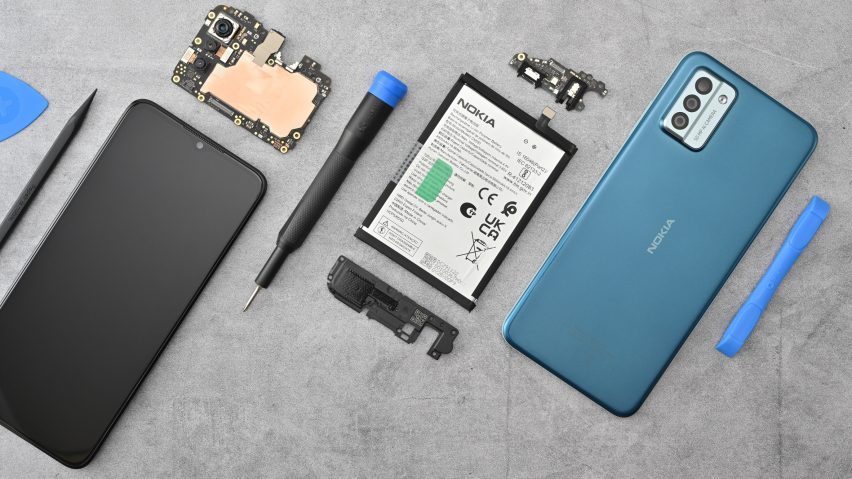Finnish mobile manufacturer Nokia has partnered with repair specialists iFixit to release the smartphone G22, which comes with replaceable parts and toolkits so that customers can fix their phone themselves.
The collaboration was born from the increasing demand for home solutions, as more people integrate repair into their lives, iFixit explained.
"People want to fix things themselves, and we're happy to help manufacturers meet those needs," said iFixit chief executive officer Kyle Wiens.
"We're excited to work with manufacturers like HMD Global [Nokia's parent company], who want to make repairs more accessible," Wiens told Dezeen.
The Nokia G22, which comes in grey or blue, has a removable back panel made from 100 per cent recycled plastic. Customers can purchase spare batteries, screens, covers and charging ports from the iFixit website.
Each part comes with a set of corresponding tools such as a pair of tweezers, a suction handle and opening picks. Users can then read the accompanying instructions detailing how to solve common smartphone issues, including changing the battery, charging port and replacing the screen.
The tools are made of an engineered plastic called Delrin – a stiff, engineered thermoplastic often used to make bearings, fittings and various electrical insulator parts. Meanwhile, the screwdriver is made from steel.
By providing the tools and instruction manual for people to use at home, Wiens hopes to offer an affordable alternative to external repair services that often come with long waiting times.
Modular phones have a prolonged lifespan because their hardware can be easily changed and updated.
"People are starting to change their minds and want durable and sustainable things, for the Earth but also to save money," Wiens explained.
"It's an economical and ecological necessity – we can't continue to live as if the planet doesn’t need help. In the last 20 years, Right to Repair has become more important with more and more people integrating repair into their life."
The Right to Repair Regulations was introduced by the UK government in 2021 with the aim of reducing energy usage and electrical waste. Part of the law stipulates that manufacturers make spare parts and maintenance information available for their products.
iFixit, which has been providing repair services for two decades, drew on its experience of fixing customer phones to identify the most common smartphone repair requests. It also structured the repair instructions to be understood easily.
"Over the years, we've learned firsthand what repairs will be easy or what challenges people will face," Wiens said.
"Before people start a repair, we recommend they read through the whole guide to know what they're going to be doing," he added. "With patience, the right tools and guides, anyone can fix anything."
Nokia's G22 follows in the footsteps of Dutch social enterprise Fairphone, which has led the way with smartphones that can be repaired easily by consumers with its ethically produced mobiles.
A growing number of phone manufacturers have partnered with iFixit on repair-based models, including Google and Samsung, which have also released mobiles that can be purchased alongside DIY manuals and replaceable parts.
Designers have previously called for electronics companies to make their products more easily repairable. In 2018, design duo Formafantasma argued that electronics companies should make their products easier for anyone to open up and take apart.
The duo is calling on designers to look into recyclability following a two-year research project into e-waste.
The images are courtesy of iFixit.

